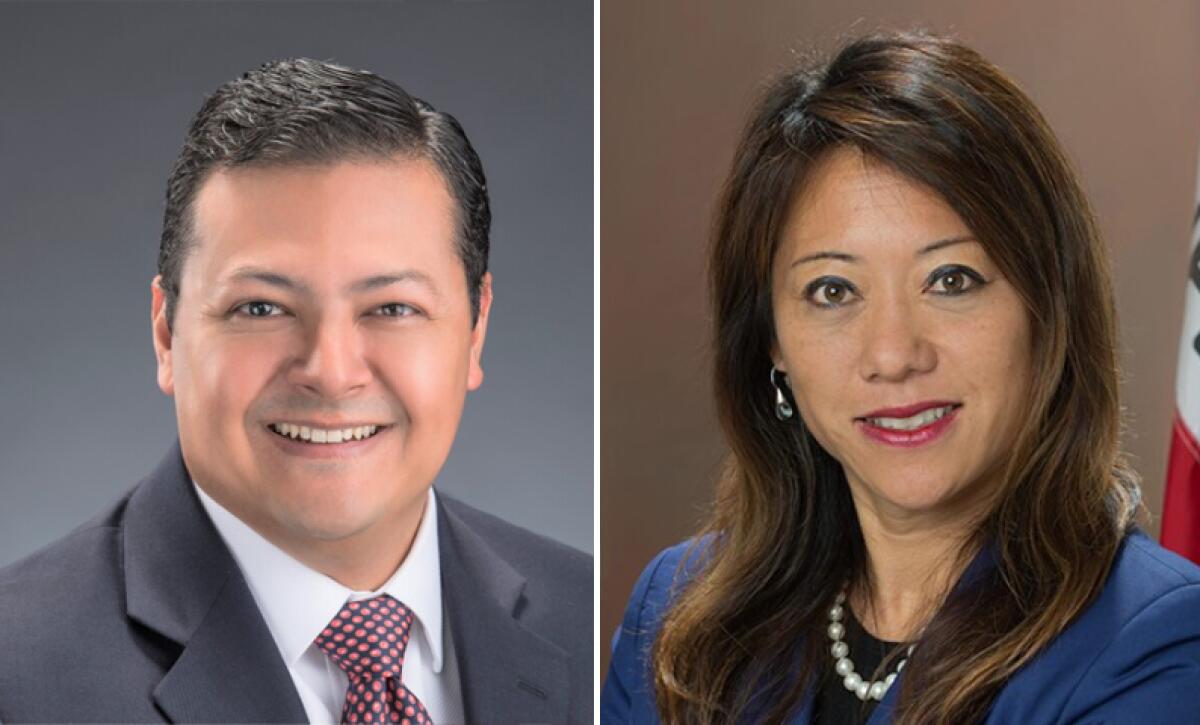In race for California’s top banker, Cudahy councilman looks to oust incumbent who weathered political storms

- Share via
Republican Jack Guerrero in the November election faces the difficult task for trying to unseat Democratic state Treasurer Fiona Ma, who won a lopsided victory in the June primary and remains popular among California voters despite a string of scandals.
The treasurer is the state’s top banker and is responsible for managing its finances and investments, and serves on powerful boards and committees that oversee the state employee pension systems and allocate state bond financing for projects for affordable housing, education, infrastructure and the environment.
Throughout their campaigns, the two candidates have continued to lay down opposing visions of how to approach the job of California’s top banker. Ma is hoping to build on programs she championed during her first four years. Guerrero, a Cudahy councilman since 2013, looks to shake up the office and Sacramento politics, which he said is responsible for the “mismanagement” of taxpayer dollars.
“The time has come for an independent watchdog who is free from the single-party apparatus in Sacramento, to bring checks and balances to the government, and to serve honorably and tell the truth to taxpayers of our dire financial condition,” Guerrero said in February while announcing his candidacy.
Although Guerrero’s large, reformist promises were enough to win him 1.4 million votes in the June primary, he was still outmatched by Ma, who won 3.8 million — 57% of the ballots cast.
Ma is also outpacing Guerrero in fundraising. Guerrero has gathered $20,000, while Ma has raised more than $4 million.
Unseating an elected incumbent state treasurer is rare. Voters haven’t selected a challenger since 1958.
Guerrero is also attempting to become the first Republican treasurer since Matt Fong was elected to the office in 1995, a steep climb in a state in which nearly 47% of registered voters are Democrats, 24% are Republican and close to 23% are “no party preference.” No Republican has been elected to a statewide office since 2006.
He has attempted to make up ground by criticizing the way the state is handling its debt, credit rating and the large amounts of unfunded debt of CalSTRS and CalPERS, which manage pensions for California public school educators and other public employees. He has said the state is overspending on “pet projects,” and he calls for fewer taxes and less government spending.
Guerrero said that, if elected, he plans to show up on the Senate and Assembly floors to warn lawmakers about spending bills that would increase state debt.
“I’m going to be doing that until the legislators are sick and tired of seeing my face,” he said.
Throughout the campaign, Ma has emphasized her history of working with lawmakers to pass legislation that boosts funding to address some of the state’s largest issues, such as the housing crisis.
Ma had championed Assembly Bill 140, passed in 2021, which gives the treasurer’s office a say in the direction of the California Dream For All program, which aims to make home ownership, especially for first-time homebuyers, more affordable. The bill has been heralded as a valuable tool to help close the racial wealth gap.
She also is focused on streamlining the process for distributing funding for affordable housing projects, which she said could move more efficiently and with more transparency for those applying for bonds and tax credits.
“If we can make that happen, that would be like the crown jewel for housing,” she said.
Other initiatives she supported include the Cal KIDS program, which gives every child born in California on or after July 1 up to $100 automatically, and up to $1,500 automatically to every eligible low-income student to help pay for and encourage saving for college; and CalSavers, which required all businesses and nonprofits with five or more employees in the state to either offer their adult workers a “qualified” retirement plan or sign up for state-run retirement savings programs.
Ma’s tenure has also seen controversy. She was criticized for charging taxpayers more than $32,000 in lodging and meal expenses to travel regularly from her home in San Francisco to Sacramento, a practice that other statewide officers do not engage in, a Sacramento Bee investigation found. She has also been sued by a former employee who accuses her of sexual harassment and wrongful termination.
Ma has rejected accusations of misconduct and called ongoing litigation “frivolous” and the result of a “disgruntled employee” who was terminated for performance issues. She said she now commutes to and from her home in San Francisco each day.
A former San Francisco Board supervisor and state assemblymember, Ma has remained popular among voters despite several scandals.
Guerrero, who, like Ma is a certified accountant, ran for local office after his city of Cudahy was rocked with scandals. As mayor aiming to move his hometown city past its legacy of corruption, he called on the state controller to audit the city’s finances and administrative controls.
Guerrero said he intends to help low-income Californians through training programs for joining the workforce, and for the government to offer incentives to encourage investment in the private sector to address areas of need.
“For all quality of life, I think the private sector is the best hope that we have,” he said.
More to Read
Get the L.A. Times Politics newsletter
Deeply reported insights into legislation, politics and policy from Sacramento, Washington and beyond. In your inbox twice per week.
You may occasionally receive promotional content from the Los Angeles Times.











